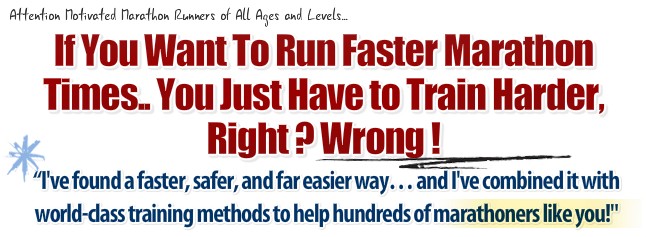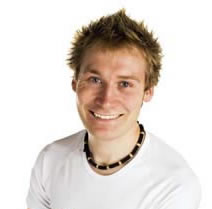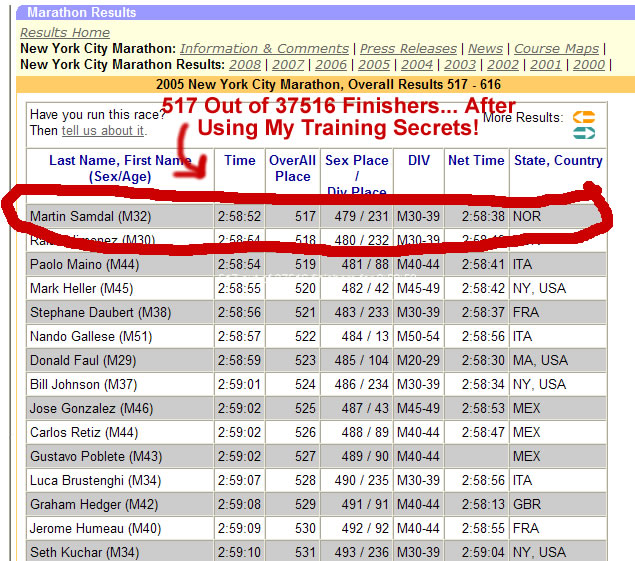 | |
“ I've found a faster, safer, and far easier way… and I've combined it with my world-class training methods to help hundreds of motivated marathoners like you drastically slash their personal best times, decrease their training injuries, and eliminate burnout.” | 
From The Desk of:
Dr. Marius Bakken 2 Time Olympic Runner and M.D. |
Here's how it works…
Dear Fellow Runner,
You're taking on the ultimate challenge, the marathon, and that takes a strong level of ambition and desire to compete against others… and yourself.
You train for weeks and weeks — many times by yourself — just to get ready for race day.
After spending so much time and effort, it's only natural to want to do your best.
Your goal may be as simple as wanting to run faster than a friend. Or perhaps it's to set a new personal best for the marathon.
That's why you worry about picking the "right program". The problem is, there's so many programs that seem incomplete. Or they aren't a good fit for your skills or abilities.
Imagine being able to open up the brains of a top marathon training coach… or a 2 time Olympic runner…
Imagine you could pull out every single proven tip, tactic, and technique for slashing your training and race times to the bone. We're talking about turning ordinary runners into very good marathoners in a relatively short time.
You are about to grab a major competitive edge.
The type of edge that can slash minutes off your best race times. The type of edge that can transform an ordinary runner into a very good marathoner. Best of all, it's the type of edge that 99.9% of all runners will never discover or even have access to.
Let me explain.
Hi, my name is Marius Bakken. I am a two-time Olympic runner who has competed in races throughout the world. Recently, I decided to take a break from competing on an international level and pursue my life-long dream of becoming a physician so I enrolled in medical school which I completed in 2010. (I'll explain why my decision to become a physician is important to you in just a moment.)
I'm just as proud to say that for two consecutive years I was the second fastest non-African 5k runner in the world with a 13.06.39 personal best.
Now you may not realize it, but getting to the level of international competition wasn't easy for me. I don't consider myself to be a naturally gifted runner. I didn't wake up one day ready to compete on an international — or even national — level either.
Not at all.
In fact, I started out as an ordinary guy who loved to run.
And because I loved to run, it was only a matter of time before I wanted to compete against other runners. In order to become a faster runner, I've spent many years training hard to become a faster runner.
That was before I discovered that training hard isn't enough.
Training hard is okay but it's even more important to train smart instead.
How An Ordinary Rookie Runner Cracked The Top 550
In The New York City Marathon... On His First Try!
Fast forward to the summer of 2005. A friend of mine named Martin Samdal asked me for some advice. He had already reserved his spot to compete in the upcoming New York City Marathon.
In fact, it was going to be the first ever marathon that Martin had ever run.
The problem is, he had done little or no training over the summer. Now he was about 12 weeks from having to run in the actual event and was starting to feel a little overwhelmed.
Like many new marathoners, he wasn't sure how to go about training properly. He was confused about what he needed to do so that he was in peak condition on race day.
In other words, he needed a field-tested and proven plan!
I took some of the best Kenyan and Italian training techniques I knew and quickly wrote up a training schedule for Martin. As I handed the schedule to Martin I thought to myself, “This is better than nothing. At least it gives him a good plan he can follow without hurting himself.”
Honestly, I had some serious doubts about how well Martin would do. After all, he was closer to being a coach potato than a world class Kenyan runner.
Boy was I wrong!
You can imagine my surprise as Martin dropped almost 20 pounds during those 12 weeks of training.
But that was just the tip of the iceberg.
Competing in his first ever New York City Marathon, Martin ran a 2:58:52!
In fact, during the last 6 miles of the race — when most marathoners are running out of gas — he passed 252 other runners and grabbed a top 600 finish.
Here's the official NYC marathon results for Martin
After 12 weeks of
the training program! |  |
All of this as a first-time marathoner.
I use to think this modern marathon training method only worked for the very best runners.
Not so.
It turns out my Kenyan-Italian hybrid training system works for any type of runner… even an out-of-shape guy who needs help to have his best running experience ever. It works for even brand-new marathoners who want to finish their first ever race in style instead of shame.
In fact here are a few of the early “test subjects” on this program (Some of the names have been partially withheld at the runners request for privacy):
 | Margaretha Baumann - 2:42.16 Hamburg marathon 2008. She did this after following the training guidelines determined by her 10 minute personal record (P.R.) |
 | Jens Kristian Berg - 2:34.59 Frankfurt marathon 2008. For a P.R., dipping under 2:35 despite being an over-40 runner… so much for the myth about slowing down with age! |
 | Jon G. - 3:58.09 Fredrikstad Maraton 2007. Lifetime goal of going under 4 hours. Shattered his former P.R. of 4:37. |
 | Mette H. - NYC marathon 2008 4.32.10 5946 of over 15.000 female finishers, first time marathoner, ran 3 times weekly, never ran a race before or more than 30 minutes continuous before starting the training program! |
I quickly realized there was a limit to how many runners it was possible to personally train.
First, being in medical school has left me with very little extra time to help others.
Second, not everyone can travel to Norway to train… especially if they live somewhere else in the world.
That's why after years of testing, refining, and proving it works, I've therefore decided to make my ''coaching clients only' training program available to the general public.
First, let me clear up one common misunderstanding about the program.
I decided to call it the “100 Day Marathon Plan” because the average length of time many experienced marathoners use to train for their next marathon is 100 days. That's because they want to arrive on race day in peak condition without spending too many weeks doing high-intensity workouts.
That doesn't mean 100 days is the only option.
Not at all.
In fact there is added a whole section in the program which explains how you can adjust the program to as little as 60 days or up to 150 days from race day and still use the powerful training.
If you want to succeed at the marathon you need two critical pieces. It takes both a well planned training schedule and taking care of your health to run your best race time ever.
I want to share one little fact that could make a huge difference in how you view marathon training…
It's Never One Little Secret That Turns
Ordinary Runners Into Successful Marathoners…
If you truly want to become more successful in your personal marathon challenge, then you need to start using a complete training system.
A system that can make sure you are training correctly… slash your risk of injury down to the bone… boost your motivation and puts you on the starting line on race day — ready to roll.
Let's face it…
The Best Marathon Training in the World
Won't Help… IF You Can't Stay Healthy!
| |
That's why I believe I can offer you a 1-2 powerful punch that is head and shoulders over any other training program on the market.
First, I have an extensive background in world-class training methods — used for years and proven to work with dozens of other runners besides myself. So what I teach isn't some 'extreme' program that only Olympic marathoners could survive.
Instead, I've structured everything so it's easy to customize for any runner — regardless of their age, gender, speed, or skill.
Add to that my medical background to advise you on things like proper diet, preventing and healing injuries and you've got a powerful 1-2 punch working on your behalf.
Let's face it: The marathon is
26 miles of extremely brutal running…
Even in the best of weather, it's still a big challenge for most.
There's a lot more things that could go wrong during a marathon than any other type of race. That's because there are a lot of miles and a lot of time needed to complete a marathon.
Use the right plan and your next marathon could be a wonderful experience.
Miss something important or you use an incomplete plan and you may not even be able to finish the race!
That's why properly preparing for the marathon is crucial.
Every week, I get emails from concerned runners and members of Marathon Training Schedule. Many of these emails share the same two worries…
Worry #1: They're not sure exactly what they should do in terms of day to day training, diet, and injuries…
You can find many programs and tips out there that offer some advice. But not one of them offers a complete detailed plan for both the actual running sessions and the rest of the preparation leading up to and including race day.
Because they are working with incomplete or “half-baked” plans, many runners find themselves feeling anxious and not fully prepared on race day.
They worry about “hitting the wall” around the 20 mile mark…
| |
They get anxious that their training won't work as advertised …
| |
They're not sure their diet — before and the day of the race — is the “right one”…
|
Worry #2: They're not sure how to find the best training program so they wind up with the fastest possible race time…
Let's face it: If you want to run the marathon then you are a positively unique person!
It leaves you with a serious problem. A problem that I believe I can solve.
“Okay Marius, If Your Program
Works So Well Then Why Are You
Offering It To Everyone Instead
of a Few Hand-Picked Runners?”
Good question!
The truth is, I offer this type of training materials because I love this sport. This is a great way for me to give back to the sport that has given me so much over the years even if I can't personally train each and every person in the world who wants to run their best marathon time ever.
It doesn't matter if you are running
your first marathon or you're a seasoned veteran…
… I want to help you run faster and better than you have ever done before!
I've deliberately designed the “100 Day Marathon Plan” with that goal in mind.
There's eight different training schedules ranging from the pure beginners training plan up to the 2:45 marathoner.
Specifically you have a 2:45 schedule, a 3:00, 3:15, 3:30, 4:00, 4:30, 5:00 and a pure beginners plan to pick from !
So you see, it doesn't matter what level of runner you are. It doesn't matter how fast you currently run. My “100 Day Marathon Plan” can quickly and easily be customized to your needs and abilities.
It's easy to customize because I've taken the entire program and broken it into easy-to-find sections that clearly explain things.
| |
| |
| |

 "Marius Bakken has used his unique experience as a world-class runner to put together one of the most comprehensive marathon products I have seen. The 100-day Marathon Training program is covering all topics to improve as a runner.
"Marius Bakken has used his unique experience as a world-class runner to put together one of the most comprehensive marathon products I have seen. The 100-day Marathon Training program is covering all topics to improve as a runner. 
 "To illustrate what Marius' program did to my shape: During the 12 weeks of training towards New York Marathon I "tested" myself weekly on the SRM race (3.3k). The 10th of August 2005 by the start of the schedule: 12:39, the 7th of September: 12:13, the 12th of September 11:25 and the 12th of October 11:16. That means an improvement of 11%!
"To illustrate what Marius' program did to my shape: During the 12 weeks of training towards New York Marathon I "tested" myself weekly on the SRM race (3.3k). The 10th of August 2005 by the start of the schedule: 12:39, the 7th of September: 12:13, the 12th of September 11:25 and the 12th of October 11:16. That means an improvement of 11%!
No comments:
Post a Comment